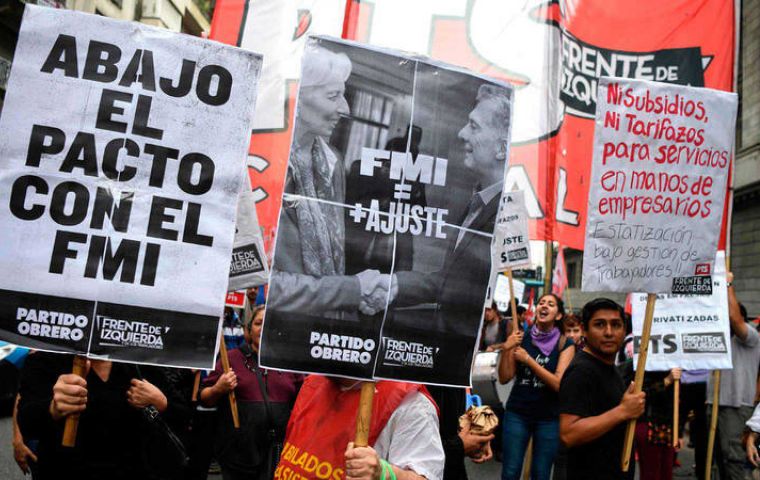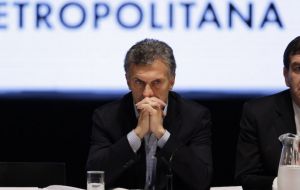MercoPress. South Atlantic News Agency
The Trouble with Argentina’s Economy
 The peso devaluation and the consequent rise in inflation have intensified Argentina’s distributive conflict, with workers demanding wage increases
The peso devaluation and the consequent rise in inflation have intensified Argentina’s distributive conflict, with workers demanding wage increases  Monetary-policy announcements will not reduce inflationary expectations, since the Macri administration missed its inflation targets for the past three years
Monetary-policy announcements will not reduce inflationary expectations, since the Macri administration missed its inflation targets for the past three years With sustained economic growth, Argentina would be able to avoid another debt crisis. Although there are no silver bullets to put the economy on a more stable path, changing current macroeconomic policies would at least give the country a chance.
In 2018, Argentina experienced a currency crisis and stagflation. Annual inflation reached 47.6%, GDP fell by 2.5%, and unemployment and poverty increased.
These indicators reflect chronic problems. Argentina’s economy has shrunk in four out of the past seven years. And, for more than a decade, structural deficiencies have created tight constraints on the growth of real demand and prevented the economy from growing sustainably.
When the current government, led by President Mauricio Macri, took office in December 2015, it said that its economic policies would attract foreign direct investment and lead to sustained increases in productivity. The currency crisis that erupted in April 2018 underscored the failure of its policy approach.
In response, the government turned to the International Monetary Fund, secured a US$ 57 billion standby loan, the largest in the IMF’s history, and agreed on a new approach to address the country’s macroeconomic imbalances. But the terms of the loan agreement have kept changing as investors remained nervous.
When the IMF approved the new deal with Argentina last June, the government said that instead of spending the funds, it would use them to increase its liquidity and restore market confidence. But when the peso fell further, the government and the IMF agreed that Argentina could use the loan to meet its debt payments and avoid a default in 2019, a presidential election year. And yet the doubts persisted. Last month, amid fears of another run on the peso, the Fund authorized the central bank to sell up to US$ 9.6bn its foreign-exchange reserves to help support the exchange rate.
The situation remains delicate, not least because much of Argentina’s public debt is denominated in foreign currencies. The IMF says the country’s debt “remains sustainable, but not with a high probability”, although the real test of Argentina’s debt sustainability will start in 2020.
With elections six months away, there are other, more immediate concerns. For one thing, the IMF-backed macroeconomic plan of contractionary fiscal and monetary policies will help to lengthen the current recession. Moreover, the monetary-policy approach seems to be repeating some of the fundamental mistakes made before the currency crisis.
Whereas the Macri administration planned to reduce the fiscal deficit gradually, the central bank took a much more aggressive approach to curbing inflation. In doing so, it relied on two main assumptions: that the government’s policies would put the economy on a sustainable growth path, and that higher interest rates would be effective in stabilizing the price level.
Both assumptions proved to be disastrously wrong. Investment in the real economy largely failed to materialize. Furthermore, high interest rates attracted short-term speculative portfolio capital, making Argentina – and the peso – increasingly vulnerable to a sudden shift in market sentiment.
The authorities should have learned at least two lessons from this. First, fighting chronic inflation requires sustained, coordinated policy efforts rather than mere monetary-policy tightening.
And, second, inflation in Argentina will continue in the short term, no matter how tight monetary policy is. Yet the authorities are persisting with the same policies.
The peso devaluation and the consequent rise in inflation have intensified Argentina’s distributive conflict, with workers demanding wage increases that compensate for lost purchasing power during the previous year. In this context, monetary-policy announcements will not reduce inflationary expectations – especially given that the Macri administration missed its inflation targets for the past three years by 15, 7.8, and 32.6 percentage points respectively. Unsurprisingly, inflation has risen again in recent months, despite aggressive monetary tightening.
Moreover, financial markets will not allow the peso’s real exchange rate to appreciate significantly any time soon. This means that the nominal exchange rate will come under downward pressure, in turn fueling further inflation. Breaking this vicious cycle will not be easy, because it requires policymakers to resolve the distributive conflict in a sluggish economy.
Meanwhile, the central bank continues to rely on high interest rates to support the peso. Although the bank had to act aggressively to contain the currency crisis, it has persisted for too long with a costly policy of high interest rates that is now not only prolonging and deepening the recession, but also – by attracting so-called hot money– increasing exchange rate instability. And while exchange-rate interventions may be warranted in extreme circumstances, selling borrowed foreign-exchange reserves to prop up the peso will make the economy even more fragile.
In 2020, the debt situation will move to center stage. The next government will try to regain access to international credit markets with the country already heavily indebted. If the economy is showing no signs of a quick take-off by then, there will be debt distress. In that scenario, higher debt-rollover costs would be a killer for the economy, because the authorities would have to allocate a larger share of the country’s stagnant foreign-currency revenues to repay debt.
The new government would then face two unpleasant options: a straitjacket of higher debt payments, more austerity, and more recession, or a painful debt restructuring with an uncertain outcome.
One thing is clear: to be able to avoid another debt crisis, Argentina will need sustained economic growth. Although there are no silver bullets to put the economy on a more stable path, changing current macroeconomic policies would at least give the country a chance.
By Martin Guzman
Martin is a research associate at Columbia University Business School and an associate professor at the University of Buenos Aires, is a co-chair of the Columbia Initiative for Policy Dialogue Taskforce on Debt Restructuring and Sovereign Bankruptcy and a senior fellow at the Centre for International Governance Innovation (CIGI).




Top Comments
Disclaimer & comment rules-

-

-

Read all commentsReading something besides Marxist theology probably wouldn't hurt you either.
Apr 13th, 2019 - 12:55 am +1And for all your “reading”, you cite none of it.
@EM
Apr 13th, 2019 - 10:05 pm +1“free market, globalist ideas totally out of sync with what most countries are doing right now.”
Shouldn't the similarities between Trump and CFK worry you just as much as those idiots you're arguing with?
EM
Apr 20th, 2019 - 02:37 pm +1“....while toying with the country's economy with free market, globalist ideas totally out of sync with what most countries are doing right now.”
Sounds like you don't like the idea of a free-market....strange, because 1) you live in a free-market (Canada), and by what I can tell, you love it ; 2) if a 'free-market' (the aim of which is to get the private sector to stand on its own two feet) ain't the solution, what is, in your opinion ? Perhaps a closed economy, with protectionist policies, 'n dominated by State-owned companies ? (which usually lead to inefficiency and high prices).
While 'globalism' may have its advantages, in that it theoretically opens up world markets,
it is a concept pushed by leftist-liberals (your mentors) - and unfortunately, at least until very recently, regarded as the salvation of the world....look at the 'modern globalism' model in the EU - economic and political integration (not to mention mass-migration), now being questioned. Seems the whole system needs some serious re-thinking.
“But hey, is Macri going to take responsibility for taking the country to the edge of default in just three years?”
Funny that you are so critical of Macri (not totally without reason), yet you defend Lula “for taking Brazil to the edge of default” in just a bit longer (than 3 years).
Current problems, in both Argentina (which has a sad history of one crisis after the other) and Brazil, are not the result of recent events which just happened overnight....they were the consequence of concerted efforts (in the wrong direction) over a number of years.
Commenting for this story is now closed.
If you have a Facebook account, become a fan and comment on our Facebook Page!